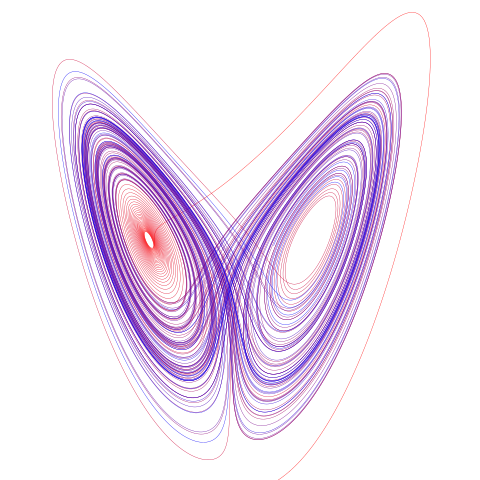
Chaos.
what is chaos?
In our culture, chaos has taken on a connotation of terrifying uncertainty. That’s unfortunate because uncertainty need not be terrifying, and chaos is not, as it’s portrayed, random. There are three main points to keep in mind when understanding chaos.
It’s aperiodic, which means it doesn’t repeat.
It’s sensitive to small changes in initial conditions, e.g., the “butterfly effect.”
It’s unpredictable because small changes are everywhere all the time.
What does chaos look like, then? Edward Lorenz helped pioneer the study of chaos back in the 1960’s. With the help of Ellen Fetter and Margaret Hamilton, he developed computational chaos models, out of which the Lorenz Attractor appeared (shown here).
There’s nothing crazy about chaos in this model. It is, by definition, disordered because no data point will repeat. Still, if you can see the pattern, an outcome is knowable, and you can make an approximation of what to expect.
When thinking about chaos theory in its application to people’s lives, the realizations are ground-shaking.
What looks like chaos is a system.
The closer you are to the system, the more random it appears. Instead, take the time to step back and see your life from a new perspective.
Tiny changes grow into significant results.
Chaos isn’t something to be avoided. Instead, the very nature of it gives me hope. Making significant changes in the direction of your life begins with very small, deliberate changes. What at one time seemed impossible becomes achievable.
Chaos is life.
It is entirely reasonable to seek order and predictability. Our brains, craving efficiency, seek out predictability in order to focus. But understanding that chaos underlies all systems means you can stop trying to control what defies control. And that means you can stop banging your head in frustration. Instead of seeking certainties, think in terms of approximations. It allows for planning and reasonable decision-making without becoming attached to any specific outcome.
Life comes from chaos.
Chaos is the birthplace of creation. The mythical Greek goddess Khaos (χάος) was the very first entity in the universe from which all else came. Chaos is generative. It is the purest state of potentiality. It is from where all things are possible. It is not destructive, as common usage implies. Instead, it is hope.
Curious how this applies to you?
Interested in learning how small changes — not big shifts — can lead you towards the life you want to live?
Schedule a free discovery call, and I’d be happy to chat more.

